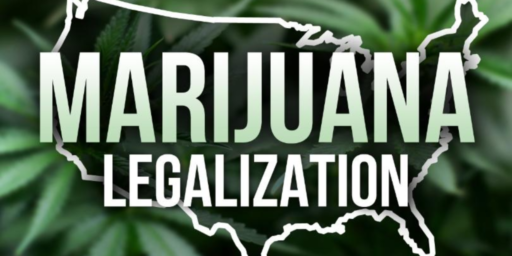California, Two Other States, Legalize Recreational Marijuana
The fight for marijuana legalization advances in California.
Californians and residents of two other states became the latest voters to legalize marijuana in a development that could run up against policy making under a Trump Administration:
California, Massachusetts and Nevada legalized marijuana on Tuesday in what advocates said was a reflection of the country’s changing attitude toward the drug.
Leading up to the election, recreational marijuana use was legal in four states: Alaska, Colorado, Oregon and Washington, along with Washington, D.C.
With the addition of California, Massachusetts and Nevada, the percentage of Americans living in states where marijuana use is legal for adults rose above 20 percent, from 5 percent.
Representative Earl Blumenauer, Democrat of Oregon and a supporter of legalization, said Tuesday’s votes would add to the pressure on the federal government to treat cannabis like alcohol, allowing each state to decide on its own regulations.
“The new administration is not going to want to continue this toxic and nonproductive war on drugs,” Mr. Blumenauer said.
The federal government’s ban on the drug precludes the interstate sale of cannabis, even among the states that have approved its use. But Tuesday’s votes created a marijuana bloc stretching down the West Coast, and Gavin Newsom, the lieutenant governor of California, said he saw an opportunity for the states where recreational marijuana is now legal to “coordinate and collaborate” on the issue, including applying pressure in Washington to relax the federal ban.
(…)
Supporters in California portrayed legalization as both a social justice and a criminal justice issue, saying the measure would help redress the disproportionate numbers of arrests and convictions among minorities for drug crimes.
“I think of this victory in California as a major victory,” said Lauren Mendelsohn, the chairwoman of the board of directors of Students for Sensible Drug Policy, a group that has campaigned against the government’s war on drugs. “It shows the whole country that prohibition is not the answer to the marijuana question.”
Ms. Mendelsohn spoke at a celebration in Oakland for the passage of Proposition 64, as California’s legalization measure was known.
Supporters of legalization in California vastly outspent opponents.
As of Nov. 6, pro-legalization committees in the state had raised around $23 million, according to the California secretary of state’s office. Chief among the backers were marijuana companies and tech entrepreneurs, including Sean Parker, a founder of the file-sharing service Napster and a former president of Facebook, who was the single largest donor to the campaign. The anti-legalization campaign had spent less than $2 million in California.
Opponents of legalization say the adoption of medical marijuana laws in more than 25 states has led to a popular perception that cannabis is good for you. They have called for more studies on the drug’s long-term effects, particularly on the developing brains of young people.
“There is likely medical promise in the marijuana plant, but that is different than saying smoked marijuana is medicine,” Mr. Sabet said. “We wouldn’t smoke the opium plant to get the beneficial effects of morphine.”
A bill to legalize marijuana in Vermont, supported by Gov. Peter Shumlin, a Democrat, failed earlier this year. But in Massachusetts, public support for legalization rose during the fall, even with bipartisan opposition from the state’s top elected officials — including Gov. Charlie Baker, a Republican, and Attorney General Maura Healey, a Democrat — and an organized anti-legalization campaign.
Lawmakers in Rhode Island were watching Massachusetts closely, and they are expected to take up a legalization measure of their own now that one has passed there.
Two other states — Arizona and Maine — were voting on recreational marijuana legalization Tuesday. Arizona voted against the measure. In Maine, a state with a libertarian streak that began decriminalizing marijuana decades ago, the referendum on legalization drew scant funded opposition.
Still, proponents of legalization said California would represent the biggest victory because of its huge economy and population and also its fertile soil and amenable climate.
Tuesday’s vote reinforced the state’s position as the epicenter of marijuana cultivation for the country, a role it has had illicitly for decades. Marijuana companies have been positioning themselves for the prospect of interstate commerce, buying large plots of land in areas that now grow vegetables and other crops.
The California measure allows people over 21 to possess limited amounts of marijuana for personal use and also permits the personal cultivation of up to six plants in private residences, provided they are shielded from public view. The sale of recreational marijuana will not be allowed until licenses are issued, a process that will take at least two years, said Steve DeAngelo, the founder of Harborside, a medical marijuana dispensary in Oakland.
California officials expect additional tax revenue of around $1 billion from marijuana sales. The revenue is earmarked for the study of medical marijuana, for the California Highway Patrol to develop procedures to determine driver impairment due to marijuana consumption, for youth education on drugs, and for the prevention of environmental damage from marijuana production, among other programs.
Support for legalization in California cut across all age groups except voters over 65, according to a Field poll released on Friday. Among those older voters, 42 percent were in favor, and 57 percent were against.
A large majority of Republicans in the poll, 65 percent, were against the measure, compared with 72 percent support among Democrats.
The legalization vote came just a month after a Gallup poll that showed that support for legalization had reached 60% of the American public and included support from nearly every demographic group with the exception of older Americans and Republicans, although even among the later group opposition had dropped to a mere plurality, so it’s not entirely surprising that the voters took the position that they did in these states. In many cases, the groundwork for legalization had already been laid due to the fact that pot had been legalized for medical use for quite some time and people could see that it had few, if any negatives from the idea of legal pot while at the same time being able to look to examples in Colorado, Washington, and elsewhere to see that legalization was a policy that made sense both because it allowed for law enforcement resources to be utilized in ways that addressed violent crime rather than arresting individuals for what ought to amount to petty offenses that caused little if any harm to others or themselves. More importantly, a victory in California likely means that the measure will be tested elsewhere in the country, such as major cities where police resources could be better focused on more serious crimes and the need for criminal justice reform.
The open question, of course, is how Washington will react to these results and to the status of marijuana legalization. The Obama Administration took the position that the Federal Government would not interfere with state laws on this subject by refraining from enforcing Federal law on the matter inside the borders of states that have chosen to legalize marijuana completely or for medical use, That was a policy decision of the Administration that was never enacted into law, though, so it’s unclear how the incoming Administration or whomever Trump’s Attorney General will be will treat that policy. If it’s continued, then residents of California and the other states where pot has been legalized will not have to worry about being snagged by Federal Laws against marijuana that carry stiff penalties and can lead to time in Federal prison. If they don’t, then tens of millions of people will be placed in legal jeopardy for no good reason. Much about that will depend upon who ends up being Trump’s Attorney General, and in that respect the signals there are mixed. Many articles are already suggesting this morning that former New York City Mayor Rudy Giuliani could be a leading contender for that position, a suggestion that doesn’t bode well for those who would hope for sanity on the drug war.
Even if there are setbacks, though, the path on legalization seems clear enough that eventually even Republicans will be forced to recognize it just as they were forced to reconcile to the increased public support for marriage equality that came before the Supreme Court’s decision on that issue. An election isn’t going to stop this issue from moving forward any more than numerous setbacks over the years stopped marriage equality from becoming the law of the land.






Count on Giuliani to ruin my mellow.
It`s working for Or and Wa. Well needed revenue.
NFL needs to follow suit. Let those guys use it. It’s okay for them to get prescription painkillers, but suspended for recreational marijuana use…kinda dumb
Trump is against recreational marijuana, but seems to be open to medical marijuana. Now if Giuliani is AG, that may be a problem. In the past Giuliani was total against medical marijuana, largely since he was a paid shill for Purdue Pharma, make of Oxycontin. Chris Christie is currently all in against medical marijuana, not sure why, maybe he just really doesn’t give a shit about people. And Pence and the Republican platform are completely against medical marijuana. It is so disheartening that as bad as Trump is he has surrounded himself with people who are just as bad or worse. I still defy anyone to really come up with something good about Trump, some quality about him that is positive. WE are getting rid of a president who is thoughtful and a very decent man, with good values. And what are we replacing him with? A man who has spent a life acting only in his self interest. And that is what is so difficult for Obama supporters to deal with.
Will the pot be subject to the full scrutiny of the FDA? Or, perhaps, the ATF? Will it be subjected to the same standards as, say, any other consumable new to the market?
I find myself highly skeptical, because there is a tremendous overlap between the people who hysterically demand such high standards for such products, and those who just really, really, really want to get effed up.
@Jenos The Deplorable:
Will these departments exist after 120 days?
Looking at Trumps 100 day plan, there would likely not be legislation that could be passed to do so, and there will ABSOLUTELY NOT be new empoyees hired to deal with it.
@Liberal Capitalist: (shrug) So the sales are put on hold until the proper regulatory infrastructure can be set up. The protection of the would-be consumers must be the absolute top priority, of course. We need regulations on purity, how it is grown and cultivated, pesticides and other treatments, properly defining and enforcing rules on “organic” pot and proper labeling, full disclosure labels, careful scrutiny of the claims and promises the producers make…
These things can’t be rushed, and I’m sure President Trump will order the appropriate regulatory bodies to give this an appropriate level of priority.
Welcome to the regulatory state the left created and nurtured and promulgated, LC.
Good, I’m going to need the occasional toke to get through the next four years.
@Jenos The Deplorable: So we don’t need regulations on banks, power plants, manufacturing, etc. because these regulations stifle growth, so the whole with protecting the public, but we desperately need them in this case.
These things can’t be rushed, and I’m sure President Trump will order the appropriate regulatory bodies to give this an appropriate level of priority.
The line above is one the funniest things anyone has ever posted here.
@Senyordave: Yes, the regulatory state needs to be curbed back to a reasonable level. But this is a very big project, and one must prioritize where it will do the most good first.
We’ll get around to making things easier for “people who just want to get effed up” in due time.
@Jenos The Deplorable:
No.
Please don’t forget: It was Nixon who started the EPA.
The “regulatory state” seems more a figment of the fevered swamps of talk radio. When one thinks of 300 million people, rules tend to need to apply.
We will likely see even more rules, as Trump is a “Law and Order President”. Or so he says.
Liberals tend to belive in individual freedoms and when individual freedoms were involved (like Weed and Guns) would defer to a states rights position.
What you imply is a return to a strong federalism, and that is not the history of this country.
.
Welcome to the topsy-turvy world where now liberals will be fighting for limited government, lower taxes on most of us, and constitutional freedoms.
@Jenos The Deplorable:
In Massachusetts, it’s private consumption and production. I’d presume that would be regulated as tightly as sharing homebrewed beer with neighbors.
@Senyordave: So we don’t need regulations on banks, power plants, manufacturing, etc. because these regulations stifle growth, so the whole with protecting the public, but we desperately need them in this case.
Sounds like you’ve been partaking a bit ahead of the law, because that bears absolutely no resemblance to anything I said here, or ever.
Are you so feeble-minded that you can’t hold an actual discussion without using stupid straw-man arguments? Do you really need to make your own arguments, then make up mine for me so you can be sure that you can win?
If so, you seem to be presenting a really good argument against legalizing pot, if that’s the best you can come up with.